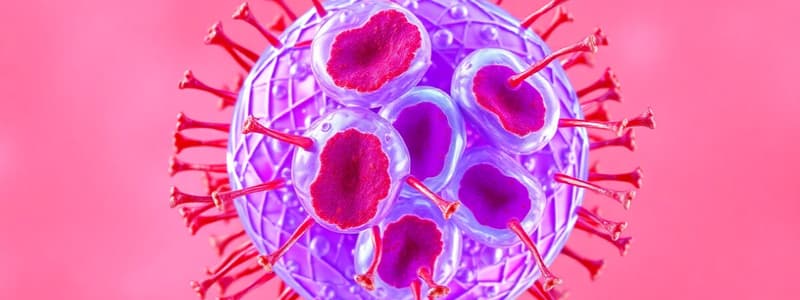Podcast
Questions and Answers
What is the primary function of cilia in the trachea?
What is the primary function of cilia in the trachea?
- To carry oxygen in the blood
- To produce mucus
- To protect the cells inside the body
- To trap and remove inhaled dust and dirt (correct)
What type of specialized cells found in the trachea are responsible for producing mucus?
What type of specialized cells found in the trachea are responsible for producing mucus?
- Bone cells
- Goblet cells (correct)
- Muscle cells
- Skin cells
Why do muscle cells have many mitochondria?
Why do muscle cells have many mitochondria?
- To carry oxygen in the blood
- To produce mucus
- To collect calcium from food
- To use a lot of energy (correct)
How do specialized cells differ from each other?
How do specialized cells differ from each other?
Which specialized cells are responsible for protecting the body from the outside environment?
Which specialized cells are responsible for protecting the body from the outside environment?
What is the main idea of this section?
What is the main idea of this section?
Which of the following is NOT an analogy used in the text to explain the function of specialized cells?
Which of the following is NOT an analogy used in the text to explain the function of specialized cells?
What is the main difference between cells in a multicellular organism and a single-celled organism?
What is the main difference between cells in a multicellular organism and a single-celled organism?
Which of the following statements best describes the relationship between function and structure of cells?
Which of the following statements best describes the relationship between function and structure of cells?
Why is the cell theory relevant to the discussion of specialized cells?
Why is the cell theory relevant to the discussion of specialized cells?
Flashcards
Specialized Cells
Specialized Cells
Cells with specific structures and functions adapted to perform particular tasks in an organism.
Cell Theory
Cell Theory
The principle stating that all cells arise from pre-existing cells, forming the basis of biology.
Tumours
Tumours
Masses of cells that grow uncontrollably, often lacking the proper function.
Multicellular Organism
Multicellular Organism
Signup and view all the flashcards
Cell Diversity
Cell Diversity
Signup and view all the flashcards
Goblet Cells
Goblet Cells
Signup and view all the flashcards
Cilia
Cilia
Signup and view all the flashcards
Mitochondria
Mitochondria
Signup and view all the flashcards
Red Blood Cells
Red Blood Cells
Signup and view all the flashcards
Study Notes
Specialized Cells
- Cells in organisms are not all identical
- Multicellular organisms are like cities, with different parts having different functions
- Specialized cells have specific functions (e.g., energy production, transportation, waste disposal)
- Cells in multicellular organisms perform specific functions instead of trying to do everything
- Specialized cells have different structures from each other
- Example: Goblet cells in trachea produce mucus, and cilia move mucus to remove dirt
Cell Specialization
- Cells adapt to their specific function
- Structure of cells changes to suit function
- Organelles vary in number and type based on function
- Cell specialization is a change in form and function
Examples of Specialized Animal Cells
- Red blood cells: Contain hemoglobin to carry oxygen, smooth shape for easy passage through blood vessels
- Muscle cells: Arranged in bundles called muscle fibers, contract to cause movement
- Fat cells: Large vacuoles for storing fat, store chemical energy
- Nerve cells: Long, thin with branches for conducting electrical impulses
Examples of specialized Plant Cells
- Photosynthetic cells: Contain chloroplasts for collecting sunlight and making sugar
- Storage cells: Contain structures to store starch for energy
- Epidermal cells: Hair on young roots for absorbing water
- Guard cells: Control water loss in leaves
Cell Theory
- Every cell comes from a pre-existing cell
- Cells are the basic units of life
- Single fertilized egg develops into a complex organism
Similarities between plant and animal cells
- Both perform specialized functions
- Both have cells carrying out tasks vital to the organism
- Cell specialization occurs in both animal and plant cells
Studying That Suits You
Use AI to generate personalized quizzes and flashcards to suit your learning preferences.




